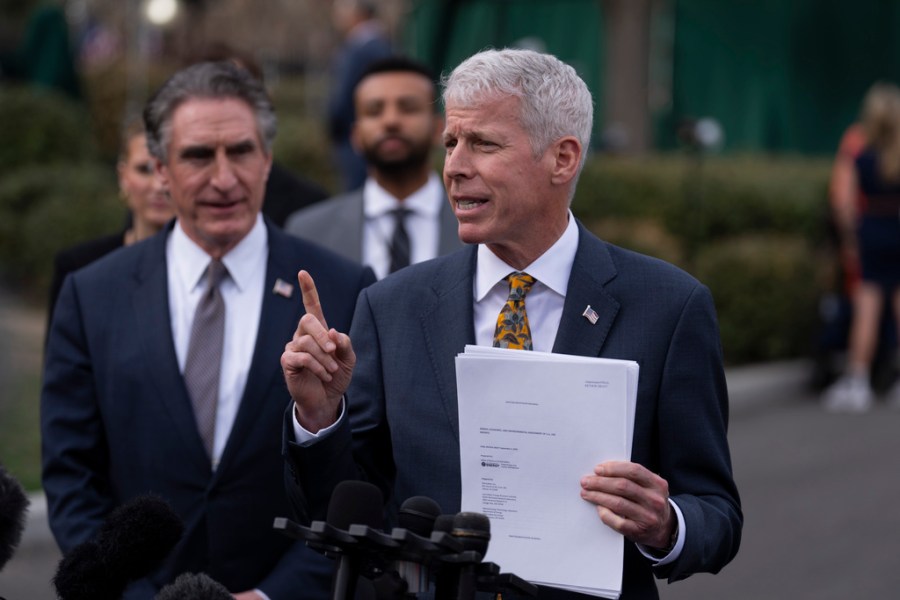
President Trump’s focus on energy has the potential to be the greatest legacy he can leave for the American people. The policies of Trump and the appointment of Chris Wright as secretary of Energy has put the United States in a decisive pro-energy position, focusing efforts on harnessing U.S. energy production and leveraging it into economic strength.
On the campaign trail Trump made it abundantly clear that his administration would prioritize American energy production and traditional fuels. In his inauguration speech, Trump declared that America would embrace “drill, baby, drill” and refill the Strategic Petroleum Reserve “right to the top.”
He said countless times that the U.S. is going to embrace the “liquid gold” under our feet and that we are going to “frack, frack, frack.” On Inauguration Day, Trump signed a series of executive orders related to energy, including removing the U.S. from the Paris climate agreement and declaring a national energy emergency, allowing the government to focus on lowering costs for households. The administration’s message is clear: America will lead the world in oil and gas production, leverage its energy strength, and increase natural gas exports.
What Trump and Wright understand that the political pundits and the past administration did not, is that energy is everything. Energy is not a sector of the economy; energy is the economy. Without access to affordable and reliable energy, businesses cannot grow, and citizens cannot heat and cool their homes.
Repealing the onerous green policies of the Biden administration and signing executive orders which focus on U.S. energy production, dominance and security begins to turn the tide to allow for more permitting, more natural gas in the electrical grid, stem the decommissioning of coal-fired power generation, and focus on lowering electricity and utility bills, for the American consumer and the American business owner.
This dramatic policy shift places U.S. energy production and energy security and affordability at the forefront, focusing on reducing the cost of living and strengthening and emboldening U.S. manufacturing. These policies enhance America’s global competitiveness. Wright has resumed permitting for the LNG export facilities, telling the world, America is open for business.
In the first Trump term, U.S. oil and gas production grew. The pro-energy, pro-growth, pro-business policies of the Trump administration meant the average household saved over $2,500 a year in lower energy costs. While oil prices did face pressure, the consumer reaped the benefit, and unlike the Biden administration, oil and gas operators were able to lease, permit and drill on federal land knowing that the contracts they entered with the government would be viable.
Two months into the Trump administration, the pro-energy policies are clear, but lingering and entrenched inflation from the past four years remain. The Federal Reserve was late to the party in raising interest rates to curb inflation, hesitated to raise them much above 5 percent, and has since lowered interest rates, recently resulting in a direct move upward in inflation and rising not falling mortgage rates.
Tariff concerns and their impact on trade and inflation are real, but many tariffs have yet to be fully implemented. Like Trump’s policies on energy, the administration’s policies on tariffs are meant to counter global competition and strengthen U.S. manufacturing, preventing cheap imports from China being dumped into the United States, much of which comes through Mexico, Canada and Vietnam.
The de minimus rule, which allows cheap Chinese goods to bypass tariffs and U.S. regulations, up to $800 per person per day, is being adjusted under policies and tariffs on China. The economic effects of tariffs can be messy, but the broader aim of protecting American workers, manufacturers and industries from unfair foreign competition in the long term is clear.
Trump also recently announced the coupling of tariffs with sanctioned crude oil from Venezuela; any country purchasing sanctioned Venezuelan crude will be tariffed an additional 25 percent. This means China.
Oil is currently below $70 a barrel. Traders are constantly reacting to geopolitical risk, escalating war and volatility in Middle East, and global economic weakness. In the face of increasing global energy demands and uncertainty, Trump’s full-throated support of American energy will change the world. America will no longer be a shrinking violet in the energy game; it will be the global leader.
Trisha Curtis is a macroeconomist with expertise in U.S. shale markets, geopolitics and China. She is CEO of PetroNerds, host of the PetroNerds podcast and an economist for the American Energy Institute.

